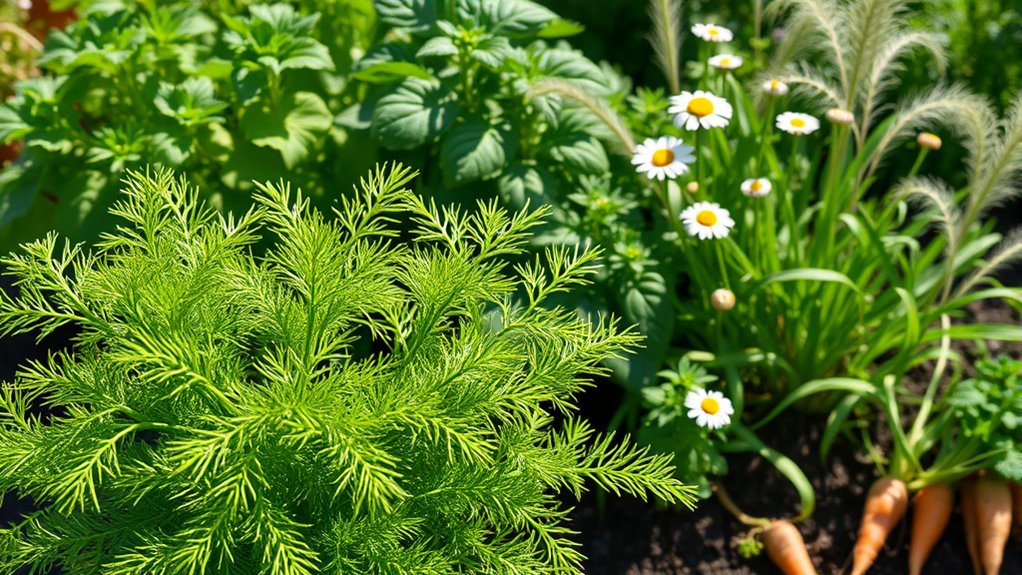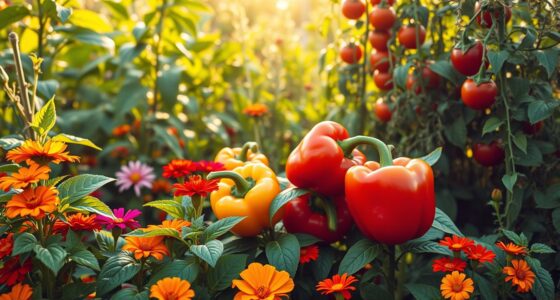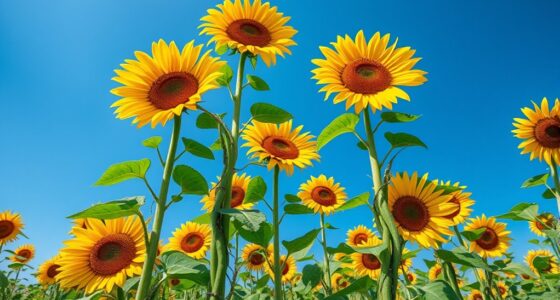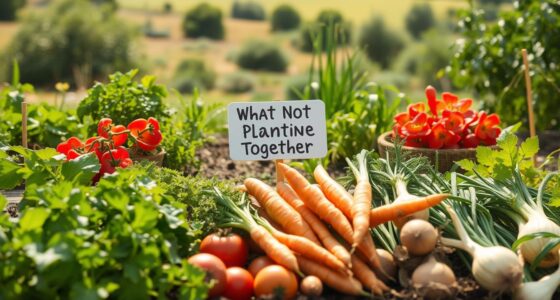If you want to improve your garden, plant dill near carrots, lettuce, cabbage, onions, and complementary herbs. Dill attracts beneficial insects that help control pests and confuses pests with its aroma, reducing damage. Planting it alongside herbs like basil and chives can boost growth and repel pests. Incorporating these companions creates a healthier, more balanced garden. Keep exploring to discover even more pairings that can help your garden thrive.
Key Takeaways
- Dill attracts beneficial insects that control pests on carrots, lettuce, cabbage, and other crops.
- It confuses pests with its strong aroma, reducing infestations on nearby plants like cabbages and carrots.
- Dill pairs well with herbs such as basil, chives, cilantro, parsley, and mint, enhancing growth and pest resistance.
- Planting dill near onions and alliums creates a natural pest barrier and improves soil health.
- Regular harvesting of dill encourages flowering, attracting pollinators and beneficial insects for garden health.
Carrots and Root Vegetables
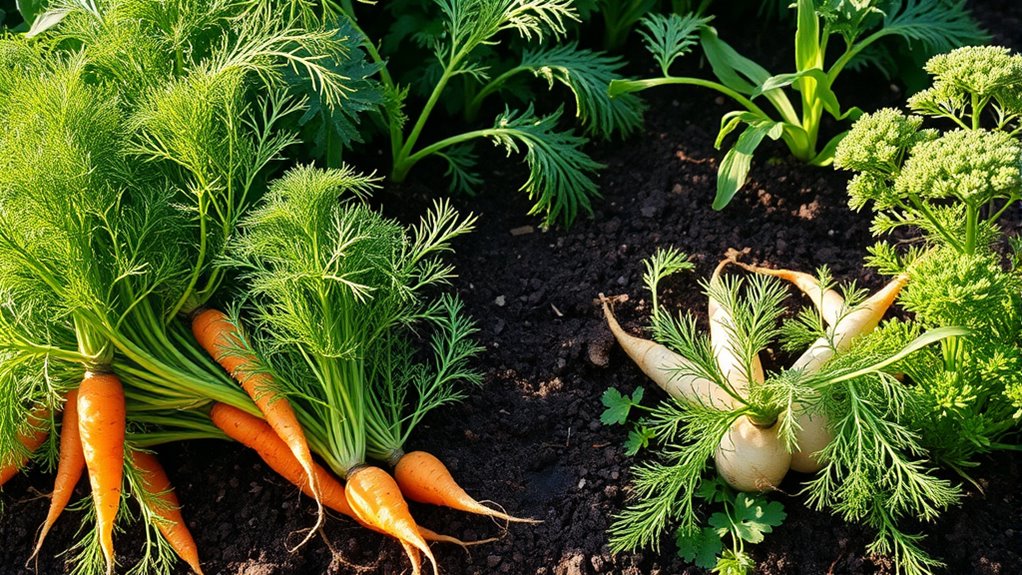
Carrots grow well alongside dill because dill attracts beneficial insects that help keep pests away from root vegetables. When you plant dill near carrots, it draws in ladybugs and parasitic wasps that target common carrot pests like aphids and carrot flies. This natural pest control reduces the need for chemical interventions and promotes healthier, more vigorous growth. Dill’s strong aroma also confuses pests, making it harder for them to locate your carrots. Keep in mind, though, that dill can sometimes interfere with the growth of other plants if it becomes too crowded, so give it some space. Additionally, the color accuracy of your garden setup can influence how well you monitor plant health and pest presence. Proper companion planting can further enhance pest resistance and crop yield in your garden.
Lettuce and Leafy Greens
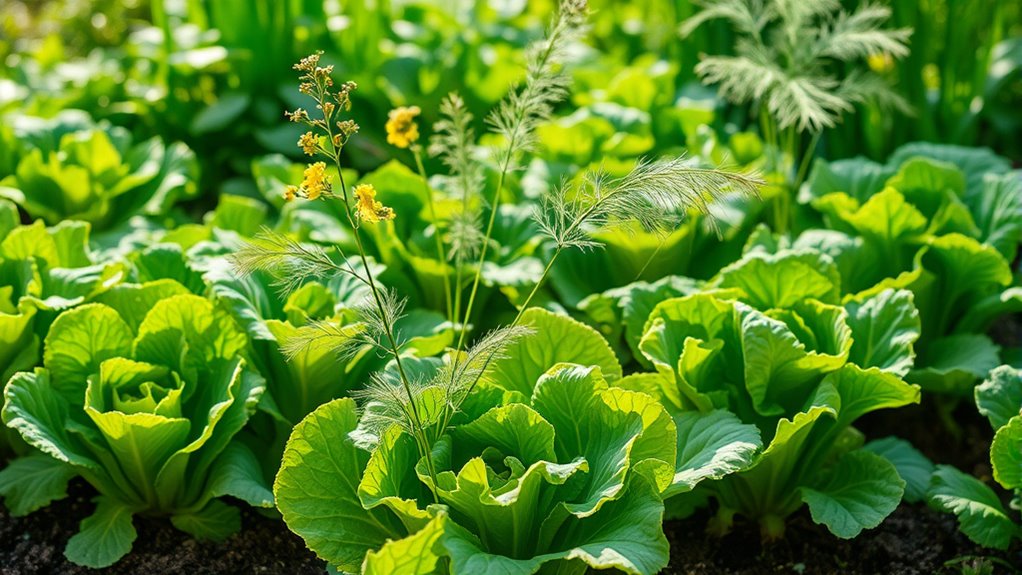
Plantting dill near lettuce and leafy greens can boost your garden’s health by attracting beneficial insects that naturally control pests. Dill’s flowers draw pollinators like bees, which help increase your greens’ growth and yield. Additionally, dill attracts predatory insects such as ladybugs and parasitic wasps that feed on aphids and other common pests, reducing the need for chemical controls. Lettuce and leafy greens benefit from dill’s pest-repelling qualities, making your garden more resilient. Keep dill planted nearby, but avoid overcrowding, so beneficial insects can move freely. Regularly harvesting dill encourages continuous flowering, ensuring a steady supply of helpful insects. Incorporating pest management strategies like this can lead to a healthier, more sustainable garden environment. The presence of dill can also support biodiversity in your garden by providing habitat and food sources for various beneficial insects. These natural interactions can further enhance your garden’s overall ecosystem balance. Overall, dill acts as a natural pest barrier, helping your lettuce and greens stay healthy and vigorous throughout the growing season.
Cabbage Family Plants
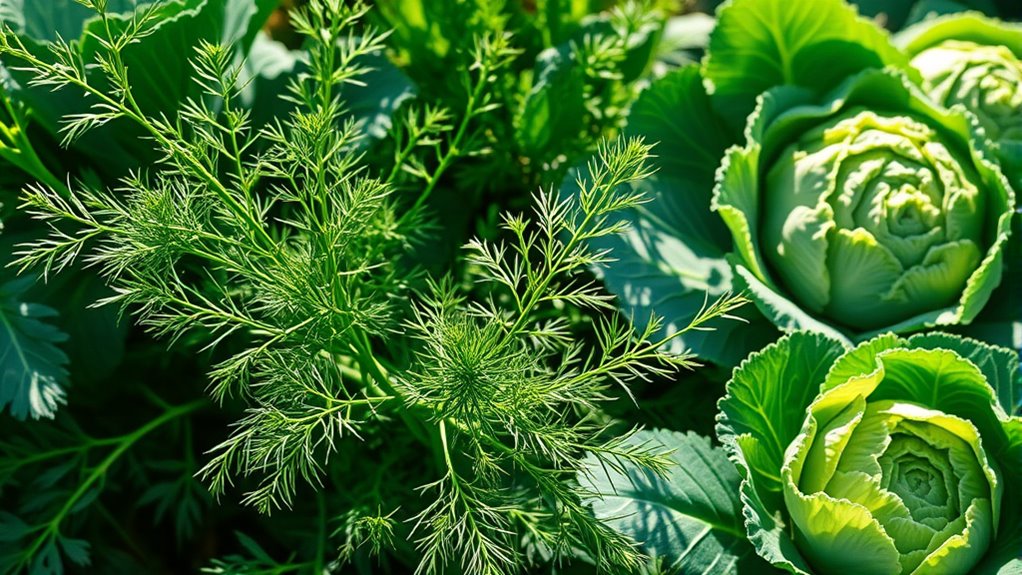
Companion planting with cabbage family plants, such as broccoli, cabbage, cauliflower, and Brussels sprouts, can considerably improve your garden’s health. These plants benefit from Dill’s presence by attracting beneficial insects that prey on common pests like cabbage worms and aphids. Dill’s aromatic foliage confuses pests, reducing infestations and protecting your crops. Additionally, Dill can enhance the growth and flavor of cabbage family plants by improving soil health and nutrient uptake. Keep in mind that these vegetables prefer well-drained, fertile soil and full sun. Plant Dill nearby early in the season to establish a pest-repelling barrier. Regular watering and proper spacing ensure healthy development. Incorporating Dill into your garden can also support overall soil health, leading to more vigorous plant growth. Proper plant spacing can further promote air circulation and reduce disease risk. Utilizing companion plants like Dill is a natural way to pest control and promote sustainable gardening practices. By pairing Dill with your cabbage family plants, you create a more resilient, productive garden ecosystem. Emphasizing integrated pest management strategies helps maintain a balanced and healthy garden environment. Additionally, planting Dill can attract beneficial insects that contribute to pollination, supporting the overall productivity of your garden.
Onions and Alliums
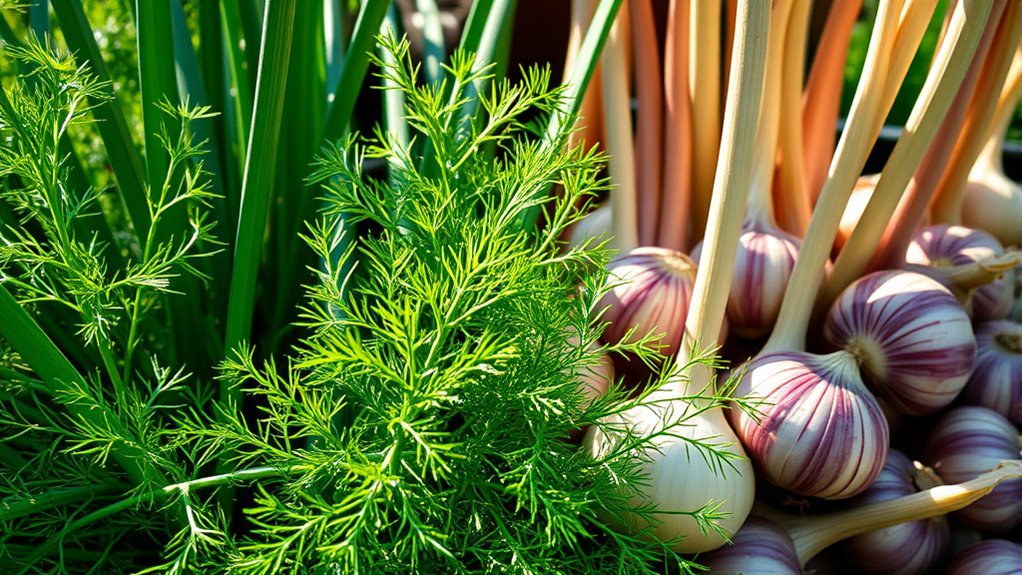
Onions and other alliums are excellent companions for many garden plants because their strong scent helps repel pests like aphids, beetles, and carrot flies. They create a natural pest barrier, protecting your dill and other herbs. Planting onions nearby can also improve soil health by deterring root maggots. To maximize their benefits, consider combining different alliums in your garden.
| Allium Type | Pest Deterrent | Additional Benefit |
|---|---|---|
| Onion | Aphids, carrot flies | Enhances soil drainage |
| Garlic | Beetles, aphids | Adds flavor to dishes |
| Chives | Aphids, slugs | Attracts beneficial insects |
| Leeks | Carrot flies | Improves soil structure |
| Shallots | Aphids, beetles | Boosts plant resilience |
Herbs That Complement Dill
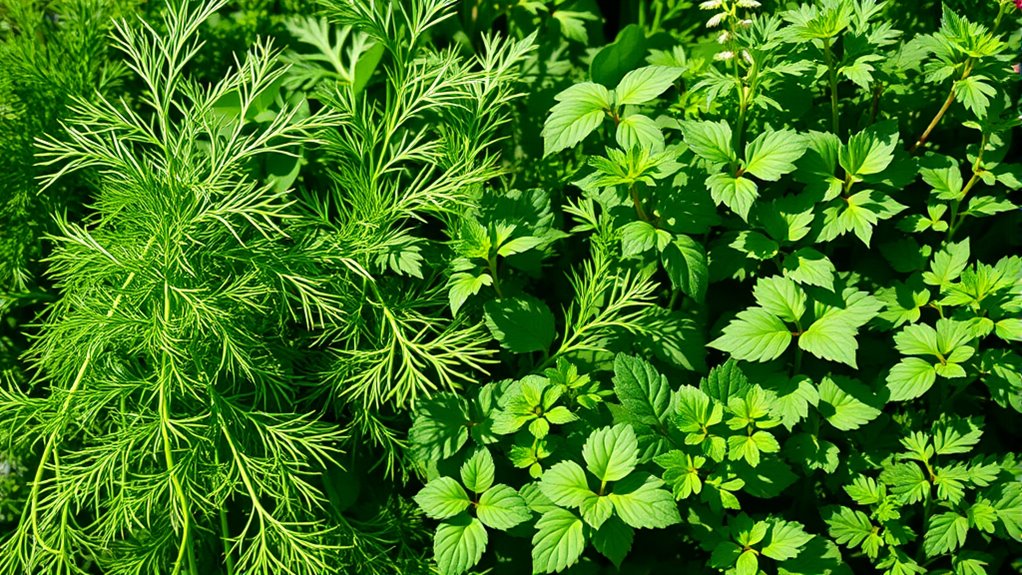
Herbs that complement dill can enhance your garden’s productivity and flavor profiles when grown together. Basil is an excellent companion, as it can boost dill’s growth and improve its aroma. Chives also work well, helping to repel pests and attracting beneficial insects. Coriander (cilantro) pairs nicely with dill, sharing similar growing conditions and flavor profiles that enhance each other in your dishes. Parsley is another good choice; it can improve overall plant health and attract pollinators. Mint, while needing control to prevent spreading, can attract beneficial insects and add aromatic diversity when kept in check. Planting these herbs near dill not only maximizes space but also creates a thriving, flavorful garden environment. Additionally, understanding plant relationships can help you optimize your garden’s health and yield, supporting healthy plant growth through beneficial interactions. Incorporating knowledge about plant compatibility can further improve your garden’s success and resilience. Recognizing companion planting principles can lead to healthier plants and better pest management, making your garden more sustainable.
Frequently Asked Questions
Can Dill Be Grown Successfully Indoors With Companion Plants?
Growing dill indoors is definitely doable, and pairing it with the right companion plants can boost its health and flavor. You should choose plants that thrive in similar conditions, like basil or chives, which also enjoy full sun and well-drained soil. Make sure to provide adequate light, water, and airflow. With proper care, your indoor garden can flourish, creating a vibrant, aromatic space that benefits all your herbs.
Which Companion Plants Help Repel Pests From Dill?
Did you know that planting certain companions can reduce pest problems by up to 50%? To protect your dill, try planting basil, which repels aphids, or marigolds, known to deter spider mites and nematodes. These plants release natural oils and scents that pests dislike, keeping your dill healthy. By choosing the right companions, you can naturally fend off pests and enjoy a thriving garden.
Are There Any Plants That Inhibit Dill Growth?
You wonder if any plants inhibit dill growth. Certain plants, like fennel, can be problematic because they compete for nutrients and space, potentially stunting dill’s development. Avoid planting dill near other herbs in the carrot or parsley family, as they may hinder its growth too. To guarantee healthy dill, choose companions that support its growth and avoid those that might create competition or produce allelopathic chemicals.
How Do Soil Conditions Affect Dill’s Companion Plant Choices?
Imagine your garden as a thriving symphony, where soil conditions set the rhythm. Well-drained, fertile soil acts like a steady beat, supporting dill’s growth and its companions. Poor soil, like a discordant note, hampers development and limits your choice of plant friends. By enriching your soil with compost and ensuring proper drainage, you create a harmonious environment where dill and its companions flourish side by side.
Can Dill Be Grown Alongside Flowering Plants for Pollination Benefits?
You can definitely grow dill alongside flowering plants to boost pollination. When you plant dill near flowers like marigolds or daisies, it attracts bees and other pollinators, which benefits both your dill and neighboring plants. This natural pollination enhances seed production and overall health. Just guarantee the flowering plants don’t compete for nutrients or space, and you’ll see increased pollination and a thriving garden.
Conclusion
By choosing the right companions for dill, you subtly invite a harmonious garden environment. When you plant carrots, lettuce, cabbage, and onions nearby, you’re fostering a gentle symphony of growth that benefits all. Incorporating complementary herbs further elevates this delicate balance. With thoughtful pairing, your garden becomes a refined retreat where each plant quietly supports the others, creating a lush tapestry of vitality. Embrace these combinations, and let your garden flourish in quiet elegance.
